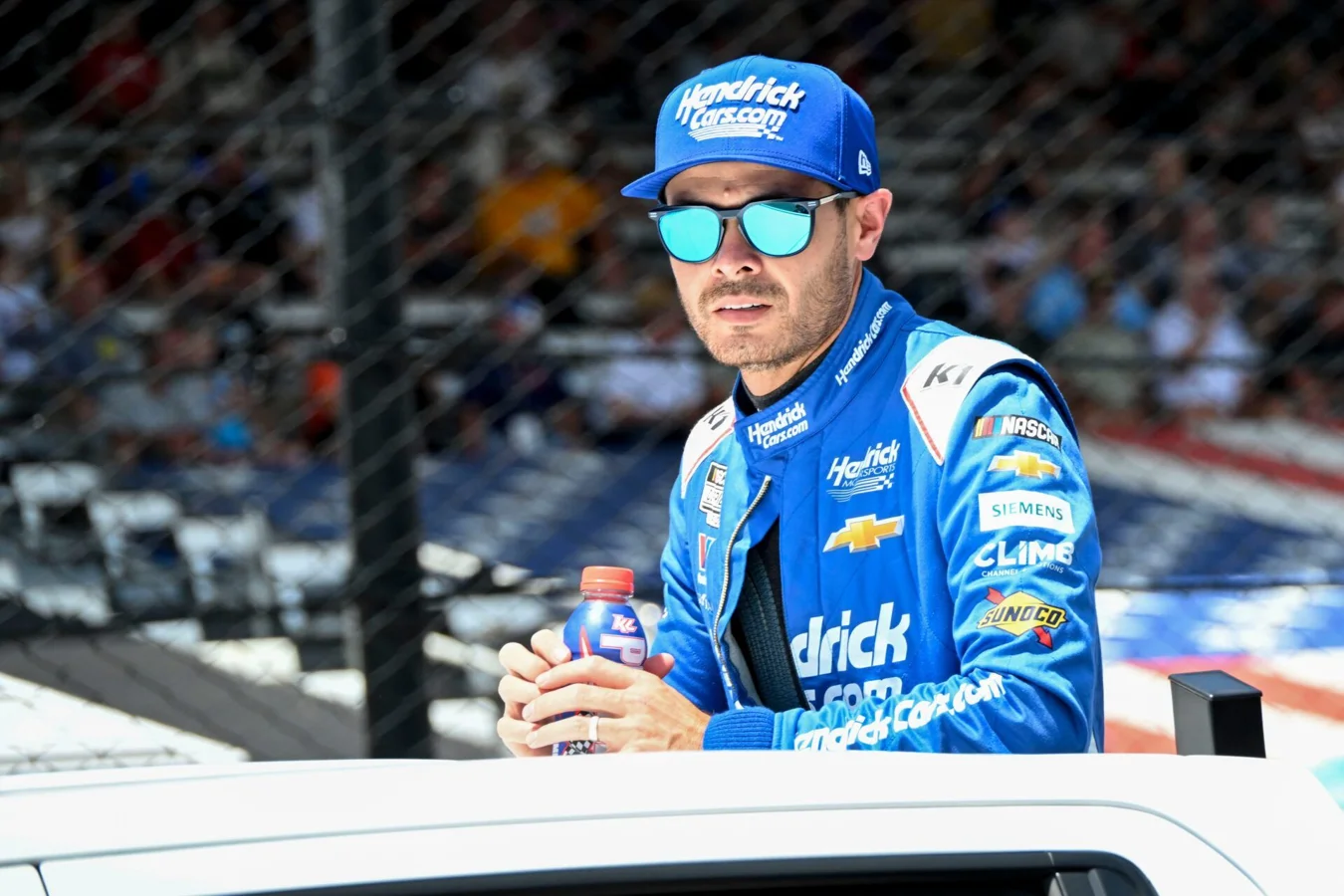Kyle Larson’s recent remarks on the “Games with Names” podcast have brought the Kyle Larson Talladega Nights controversy into the spotlight, setting off a divisive debate within NASCAR circles about comedy’s place in the sport and its reputation. This controversy, centered around Larson’s criticism of the beloved film Talladega Nights: The Ballad of Ricky Bobby, has highlighted deep divides in how drivers and fans view NASCAR’s image and its portrayal in popular media.
Larson’s Critique of Talladega Nights and Its Impact on NASCAR
During his appearance on Julian Edelman’s podcast, Kyle Larson did not hold back in addressing his concerns about how Talladega Nights: The Ballad of Ricky Bobby has influenced public perception of NASCAR. In speaking about the 2006 comedy—which featured real NASCAR drivers and gained major popularity—Larson expressed his belief that its effects on the sport have been largely negative:
“I mean, I like the movie. I think it did not do anything good for our sport. I think it turned our sport into like a joke, unfortunately,”
—Kyle Larson, 2021 Cup Series Champion
He went on to point out the film’s enduring influence, suggesting it has shaped an outsider’s understanding of the sport:
“But that is one of the most popular racing movies…I feel like the rest of the world, that’s what they think about our sport now.”
—Kyle Larson, 2021 Cup Series Champion
William Byron, another up-and-coming star in the Cup Series and Larson’s teammate, shared his support by amplifying the comments and concisely adding:
“100%. Should not be the first thing people think of.”
—William Byron, NASCAR Driver
This agreement signaled that criticism wasn’t limited to Larson alone. The endorsement from Byron hints at a possible generational reevaluation among current drivers, with a faction seeing pop culture portrayals less as exposure and more as an obstacle for how they wish the sport to be seen.
Fans Respond: Humor Under Siege or Image at Stake?
The backlash from NASCAR fans was swift and forceful, with many accusing Larson and his supporters of being humorless and taking themselves too seriously. Through social media and online forums, fans emphasized the importance of being able to laugh at oneself and questioned whether the sport’s dignity was truly at risk.
One fan voiced acute frustration with Larson’s stance:
“And this is why comedy is dead and our society is collapsing. Our sense of humor is gone. No one can laugh at the absurd or themselves anymore. Shut up and shake and bake Kyle. It’s comedy. Try it. Your feelings of self importance might be killing your sport dummy.”
—Digger310 (@idiocracy310), NASCAR Fan
Others echoed a similar sentiment, reinforcing the idea that the movie is, at its core, meant to be funny:
“Well, its a comedy so it was suppose to be funny and a joke.”
—Anonymous Fan
“It’s called a comedy movie, Kyle,”
—Anonymous Fan
These responses underlined a widening gap within the NASCAR community between those who view media parodies as part of mainstream acceptance and entertainment, and those who worry about the erosion of the sport’s seriousness and the impact of stereotypes.
Differing Opinions: Is Public Perception Worth Protecting?
While many fans criticized Larson’s statement, some defended his perspective, sharing concerns that comedic portrayals like Talladega Nights cement negative stereotypes and deter respect from potential new fans. One supporter drew a direct line between the movie’s humor and outsiders’ dismissive views:
“He is 150% correct. Non-fans think NASCAR is just a bunch of hillbillies going in circles and do not respect the sport at all. This movie is one of the many things that helps to reinforce that belief.”
—The Backmarker (@Thebackmarker21), NASCAR Fan
This divergence highlights a deeper internal conflict in NASCAR’s identity. For some, distancing from exaggerated parodies is key to elevating the sport’s profile and kicking long-standing clichés, while others argue that rejecting humor could risk alienating broader audiences or losing sight of the fun that drew many to the sport in the first place.
The Broader Debate: Where Does NASCAR Go from Here?
The intensifying Kyle Larson Talladega Nights controversy has broadened into a reflection on how much image truly matters in professional sports—and whether the balance between self-respect and self-parody can ever be struck. Larson’s critics see danger in pushing back against pop culture, fearing NASCAR will lose touch with everyday fans, humor, and fun. Defender, however, believe a more serious, less stereotyped image may be crucial for shaping how new fans perceive and value stock car racing.
This debate encapsulates a cultural crossroads for NASCAR’s growth. As the sport seeks to both attract new followers and honor its traditions, it faces a choice: lean into the attention and mainstream recognition that comedies such as Talladega Nights bring, or draw firmer lines to cultivate a more dignified public image. The outcome could define how NASCAR—and possibly other leagues—navigate the complex interplay of media, reputation, and appeal in the years ahead.
